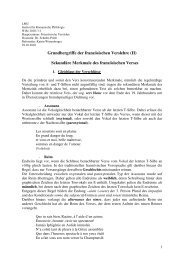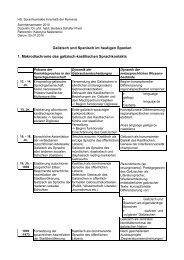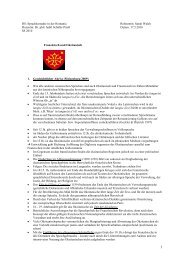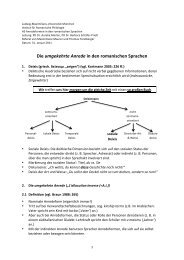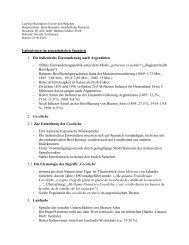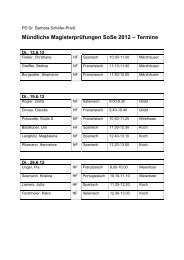Der Einfluss des Französischen auf das ... - Barbara Schäfer-Prieß
Der Einfluss des Französischen auf das ... - Barbara Schäfer-Prieß
Der Einfluss des Französischen auf das ... - Barbara Schäfer-Prieß
Sie wollen auch ein ePaper? Erhöhen Sie die Reichweite Ihrer Titel.
YUMPU macht aus Druck-PDFs automatisch weboptimierte ePaper, die Google liebt.
LMU München Referentin: Monika Svrcinova<br />
Institut für italienische Philologie Datum: 21.05.2010<br />
HS Sprachkontakte in der Romania Sommersemester 2010<br />
Dozentin: Dr.phil.habil. <strong>Schäfer</strong>-<strong>Prieß</strong><br />
<strong>Der</strong> <strong>Einfluss</strong> <strong>des</strong> <strong>Französischen</strong> <strong>auf</strong> <strong>das</strong> Italienische<br />
1. Historischer Überblick<br />
<strong>Der</strong> <strong>Einfluss</strong> <strong>des</strong> <strong>Französischen</strong> ist weitaus stärker als der <strong>Einfluss</strong> anderer Sprachen (75-80%<br />
Gallizismen)<br />
1.1 Die französische Sprache im 18. Jahrhundert<br />
- Sprache <strong>des</strong> Hofes und der Gebildeten<br />
- hat Latein als Sprache der internationalen Kommunikation in Europa abgelöst<br />
- Bildungs- und Verkehrssprache<br />
- Universalsprache<br />
Französisch: rationale Sprache (S-V-O „ordre naturel“), wissenschaftliche Terminologie<br />
Italienisch: syntaktische Freiheit (Inversion), Poesie<br />
1.2 Italien im 18. Jahrhundert<br />
- französische Gesellschaft und Kultur als Vorbild<br />
- die Kenntnis der französischen Sprache ist notwendig<br />
- Kontaktbereiche: Mode, Gesellschaftsleben, Politik, Diplomatie, Militär, Justiz, Verwaltung,<br />
Literatur, Kunst, Wirtschaft, Handel, Philosophie und Wissenschaft<br />
Beispiele: it. stoffa < fr. étoffe, it. bloccare < fr. bloquer ‘sperren’, it. scialuppa < fr.<br />
chaloupe ‘Schaluppe’, it. rococò < fr. rococo < fr. roc ‘Fels’, it. uomo di mondo < fr. home<br />
du monde ‘Weltmann’, it. ottimismo < fr. optimisme, it. allarmante < fr. alarmant<br />
(Italianismus aus dem 16. Jh.)<br />
- Idealen der <strong>Französischen</strong> Revolution (1789)<br />
- politische Macht geht <strong>auf</strong> <strong>das</strong> Bürgertum über<br />
1.3 Napoleonische Ära<br />
- politischer <strong>Einfluss</strong> (Italien unter französischer Kontrolle)<br />
- 1796 Napoleon erobert Teile Italiens<br />
- nach dem zweiten Italienfeldzug wird 1802 Italienische<br />
Republik unter französischer Führung gegründet<br />
- die Rechtsordnung <strong>des</strong> Königreichs Italien vereinheitlicht<br />
(Code civil)<br />
- Modernisierung der Verwaltung<br />
Beispiele:<br />
it. centralizzare < fr. centraliser, it. controllo < fr. contrôle<br />
it. polizia < fr. police, it. procedura < fr. pocédure<br />
1
Durch <strong>das</strong> Scheitern der napoleonischen Großmachtspolitik<br />
ging die Verwendung <strong>des</strong> <strong>Französischen</strong> stark zurück.<br />
1.4 Purismus (18., 19. Jh.)<br />
- Streben nach Reinheit der Sprache<br />
- Versuch alle Fremd- und Lehnwörter aus dem Italienischen zu entfernen<br />
- Überzeugung, <strong>das</strong>s die italienische Sprache ihren Höhepunkt im „Trecento“ erreicht habe<br />
- Hauptvertreter: Antonio Cesari<br />
- Verbannung der Fremdwörter aus der Literatursprache<br />
- in den Dialekten nach wie vor Entlehnungen<br />
Beispiele: picchenicche ‘Picknick’, tettattè ‘zu zweit’<br />
Verbreitung <strong>des</strong> einheitlichen Sprachbewusstseins - wesentliche Voraussetzung für<br />
Entstehung einer nationalen Identität.<br />
Großes Problem: Analphabetismus lag bei mehr als 70%<br />
2. Sprachliche Einflüsse <strong>des</strong> <strong>Französischen</strong> <strong>auf</strong> <strong>das</strong> Italienische<br />
2.1 Kontaktbereiche<br />
● Mode und Kosmetik:<br />
it. moda (alla moda) < fr. mode<br />
it. décolleté < fr. décolleté ‘Dekolletee’<br />
it. brillantina < fr. brillantine ‘Brillantine’<br />
it. pedicure < fr. pédicure ‘Fußpflege’<br />
it. marrone < fr. marron ‘braun’<br />
● Haushalt:<br />
it. boudoir < fr. boudoir ‘Damenzimmer’<br />
it. comò < fr. commode ‘Kommode’<br />
it. secrétaire < fr. secrétaire ‘Sekretär’<br />
it. griglia < fr.grille ‘Rost’<br />
it. serra < fr. serre ‘Treibhaus’<br />
● Nahrung:<br />
it. ristorante < fr. restaurant<br />
it. menu < fr. menu<br />
it. coperto < fr. couvert ‘Gedeck’<br />
it. bomboniera < fr. bonbonnière<br />
it. <strong>des</strong>sert < fr. <strong>des</strong>sert ‘Nachspeise’<br />
it. ragù < fr. ragoût ‘Ragout’<br />
it. sciampagna < fr. champagne ‘Sekt’<br />
● Theatre:<br />
it. debutto < fr. début ‘Debüt’<br />
it. messa in scena < fr. mise en scène ‘Theater<strong>auf</strong>führung’<br />
it. soirée < fr. soirée ‘Abendgesellschaft’<br />
it. foyer < fr. foyer<br />
it. claque < fr. claque ‘bezahlte Gruppe von Leuten, die Beifall klatschen’<br />
2
it. caffè concerto < fr. café-concert ‘Varieté, Kabarett’<br />
it. cancan < fr. cancan<br />
● Militärwesen:<br />
it. affusto < fr. affût ‘Lafette’<br />
it. ambulanaza < fr. ambulance ‘Ambulanz’<br />
it. appello < fr. appel ‘Appell’<br />
it. avamposto < fr. avant-poste ‘Vorposten’<br />
it. marmitta < fr. marmite ‘großer Topf, Kessel’<br />
it. pioniere < fr. pionnier ‘Vorkämpfer’<br />
● Politik und Verwaltung:<br />
it. club < fr. club ‘Verein’<br />
it. giacobino < fr. Jacobin ‘Jakobiner’<br />
it. dossier < fr. dossier ‘Aktenbündel’<br />
it. comunardo < fr. communard ‘Mitglied der Kommune’<br />
it. sciovinismo < fr. chauvinisme ‘Chauvinismus’<br />
it. estradare qcn. < fr. extrader qn. ‘jmdn. ausliefern’<br />
it. esploatare < fr. exploiter ‘ausbeuten’<br />
● Sport:<br />
it. pista < fr. piste (ursprünglich ein Italianismus)<br />
it. bicicletta < fr. bicyclette ‘Fahrrad’<br />
it. masseur < fr. masseur<br />
it. pattinare < fr. patiner ‘Schlittschuh l<strong>auf</strong>en’<br />
● Technik:<br />
it. betoniera ‘Betonmischmaschine’ < fr. béton ‘Beton’<br />
it. alesare < fr. aléser ‘bohren’<br />
it. biella < fr. bielle ‘Lenkstange’<br />
it. volante < fr. volant ‘Lenkrad’<br />
it. lingotto < fr. lingot ‘Gussblock’<br />
● Wirtschaft:<br />
it. esportare < fr. exporter<br />
it. importare < fr. importer<br />
it. milionario < fr. millionnaire<br />
it. aumentazione < fr. augmentation ‘Erhöhung’<br />
2.2 Griechische Wörter<br />
It. energico < fr. énergique ‘energisch’, it. epidemico < fr. épidémique ‘epidemisch’, it.<br />
erotico < fr. érotique ‘erotisch’, it. pederasta < fr. pédéraste ‘männlicher Homosexueller’, it.<br />
elettrico < fr. électrique ‘elektrisch’<br />
2.3 Wörter aus anderen Sprachen<br />
it. narvalo < fr. narval < norw. Nar whal ‘Narwal’<br />
it. steppa < fr. steppe < rus. степь [step’] ‘Steppe’<br />
it. vagone < fr. wagon ‘Eisenbahnwagen’ < engl. waggon ‘gedeckter Waggen’<br />
it. rivista ‘Zeitschrift’ < fr. revue < engl. review<br />
3
it. luna di miele ‘Flitterwochen’ < fr. lune de miel < eng. honeymoon<br />
it. turismo ‘Tourismus’ < fr. tourisme < engl. tourism<br />
2.4 Art und Weise der Übernahme von Gallizismen<br />
● französische Orthographie (Bildungswörter)<br />
élite, réclame, coup de tête ‘Kopfstoß’, banale, surmenage ‘Überarbeitung’<br />
● phonologische und graphische Anpassung (volkstümliche Wörter)<br />
it. salvataggio < fr. sauvetage ‘Rettung’<br />
it. sciantosa < fr. chanteuse ‘Sängerin’<br />
● Lehnübersetzung (calco linguistico)<br />
it. intravedere < fr. entrevoir ‘ahnen, durchblicken’<br />
it. essere al corrente < fr. être au courant ‘<strong>auf</strong> dem L<strong>auf</strong>enden sein’<br />
it. frattempo < fr. entre-temps ‘Zwischenzeit’<br />
it. malinteso < fr. malentendu ‘Missverständnis’<br />
it. sorvegliare < fr. surveiller ‘bewachen’<br />
it. rendiconto < fr. compte rendu ‘Bericht’<br />
Schwankungen: brochure vs. brossura; bureau vs. burò; rendez-vous vs. rendevù; bleu vs.<br />
blo, blu; chic vs. scicche; toilette vs. toeletta, toletta<br />
2.5 Morphologie<br />
- Suffixe -erie → -eria it. orologeria < fr. horologerie ‘Uhrmacherladen’<br />
-et → -etto it. rubinetto < fr. robinet ‘Wasserhahn’<br />
-é → -ato it. assegnato < fr. assigné ‘zugewiesen’<br />
(-ine → -ina, -on → -one, -ot → -otto usw.)<br />
2.6 Syntax<br />
- unmittelbare Vergangenheit: it. vado a fare<br />
- nahe Zukunft: it. vengo di leggere (fr. venire de faire qc. – ‘soeben etw. getan haben’)<br />
- Gerundium: it. in leggendo < fr. en lisant<br />
- Superlativ mit der Wiederholung von Artikel: il cuore il più sensibile<br />
- È lui che l’ha detto statt l’ha detto lui<br />
- non + Verb + che statt fuorché… ‘außer <strong>das</strong>s…’<br />
2.7 Pseudogallizismen<br />
porte-enfant ‘Babytragetasche’, zuppa santé ‘Hühnerbrühe’<br />
Literatur:<br />
Battisti, Carlo/Alessio, Giovanni (1975): Dizionario etimologico italiano. Firenze.<br />
Durante, Marcello (1982): Dal latino all’italiano moderno. Bologna.<br />
Magazzini, Claudio (1994): La lingua italiana. Bologna.<br />
Migliorini, Bruno (1991): Breve storia della lingua italiana. Firenze.<br />
Lorenzetti, Luca (1998): Italienisch und Romanisch. In: Günter Holtus (Hrsg.), Lexikon der<br />
romanistischen Linguistik, Tübingen, 1998, 32-55.<br />
4



